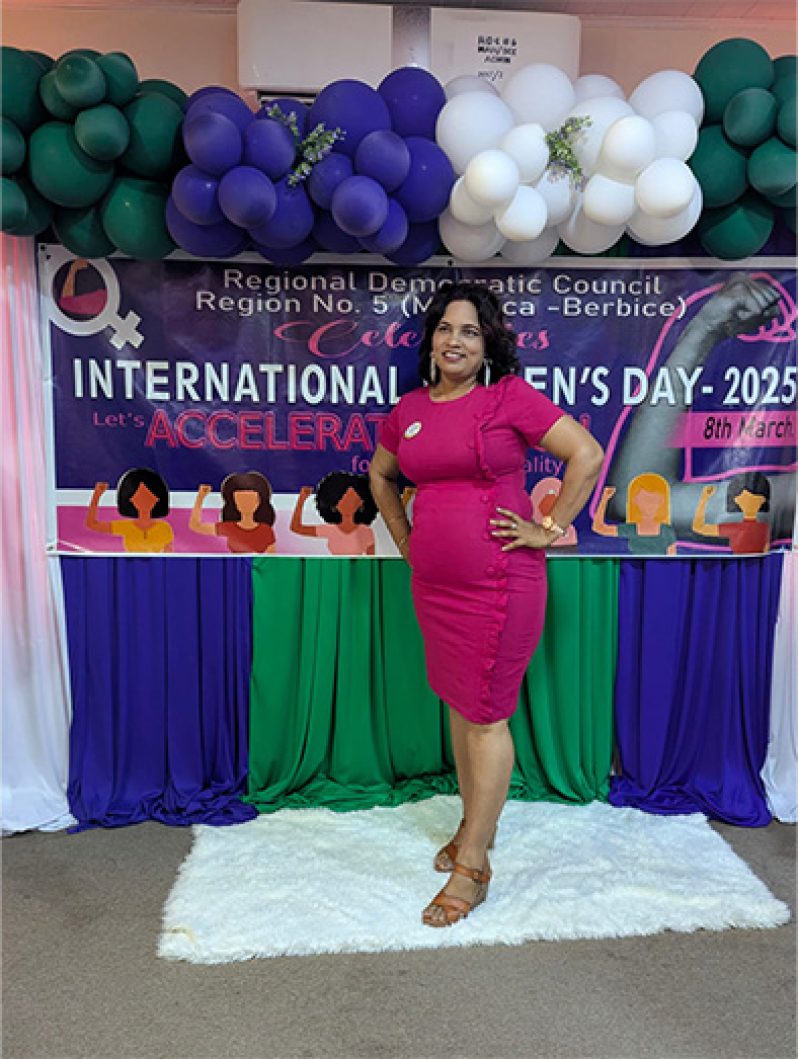WHEN Vidyawatie “Molly” Balram speaks about her animals, her face glows with enthusiasm. The 37-year-old small ruminant farmer of Number 37 Village, West Coast Berbice, is eagerly preparing to make her debut at the Guyana Livestock Development Authority’s (GLDA) Ruminant Expo and Competition, set for today (Sunday, October 12, 2025), at the Rising Sun Turf Club, Weldaad.
Her entry—a striking young black buck named “Jimmy”—is the pride of her farm. With guidance from GLDA Livestock Extension Officer Ms Carmelita Fleming and Veterinarian Dr Joel Dilchand, Molly has been meticulously grooming Jimmy for the competition—bathing him regularly, trimming his hooves, and ensuring his diet maintains an ideal body condition.
“This is my first time participating, and I’m so excited,” she said with a bright smile. “Jimmy is a handsome goat with a shiny coat and strong features. I believe he has what it takes to win.”
A journey that began with Daisy
Molly’s love for livestock started quite unexpectedly in 2000, when a friend gifted her a baby goat. She affectionately named it Daisy—and from that single act of kindness, an enduring passion for animal rearing was born.
“Daisy was spoiled,” she laughed. “She drank Coca-Cola from a red cup and followed me everywhere. That’s how my love for goats started.”
Over the years, Daisy became more than just a pet—she became the matriarch of Molly’s herd. Remarkably, throughout her reproductive years, Daisy birthed only female kids, ensuring the steady growth of Molly’s flock.
Today, Daisy is still alive, though retired from breeding, and remains a cherished member of the farm—symbolising the beginning of Molly’s journey. “Every goat on my farm traces back to Daisy,” she said proudly. “She’s the mother of them all.”

From passion to purpose
From one spoiled pet, Molly’s herd has grown to over 100 goats and 20 sheep, making her one of the most promising small ruminant farmers in Jacoba Village. Her herd consists mainly of Nubians—known for their excellent meat and milk qualities.
Although livestock rearing is not her family’s main source of income, it provides an excellent supplemental livelihood alongside their small rental business and backyard cash-crop cultivation. Her husband manages the crops while Molly focuses on the animals, assisted by their young son.
A modern farm rooted in innovation
Molly attributes much of her success to the continuous guidance and technical support of the GLDA. Through the agency’s extension services, she has learned to formulate balanced animal feeds using local ingredients, administer basic veterinary care, and design proper housing for her animals.
Her elevated goat pen, constructed with GLDA’s advice, is a model of climate-smart livestock infrastructure—protecting the animals from flooding while providing comfort and ventilation. She has also adopted molasses-urea blocks and other supplemental feeding methods to combat the effects of dry spells caused by climate change.
“The GLDA has helped me tremendously,” she said. “Their officers are always available to give advice, check the animals, and teach us new techniques. Because of them, I’ve been able to raise healthy, strong animals.”
She credits her animals’ excellent body weight and coat quality to a careful focus on nutrition and hopes to further improve her herd by accessing a pedigree Boer buck through government breeding programmes. Molly also advocates for a Buck Rotation Programme, similar to the GLDA’s successful Bull Rotation Programme, to ensure small ruminant farmers in Region Five have access to superior genetics and sustainable breeding practices.
Region Five: Guyana’s livestock capital
Molly’s story unfolds against the backdrop of Region Five’s transformation into the livestock capital of Guyana—and increasingly, the Caribbean. The Government of Guyana, under President Dr. Irfaan Ali, continues to inject vital resources into the sector, focusing on improved genetics, modern husbandry techniques, and the development of resilient, climate-smart systems that empower rural farmers.

Encouraging women and youth
Molly’s enthusiasm extends beyond her own achievements. As a new and thriving farmer, she encourages more women and young people to consider livestock farming as a rewarding source of income and a path to self-reliance.
“You don’t need to know everything to start,” she said. “Once you have the interest, the GLDA team—led by Dr. Joel Dilchand—will provide the training, guidance, and ambulatory services to help you succeed. It’s a good business, and it’s something to be proud of.”
Love beyond livelihood
For Molly, farming is as emotional as it is practical. Each goat has a name, and she knows them all by heart. “If one of my goats doesn’t come home at night, I can’t sleep,” she admitted. “I go out and call until I find it. These animals are part of my family.”
As she prepares for the Ruminant Expo, Molly is filled with anticipation—not only for the possibility of winning a prize, but for the chance to showcase how far she has come from that first pet goat, Daisy.
“I never imagined that one goat could change my life,” she said. “Now, I look around and see how much we’ve grown. Daisy started it all—and Jimmy is carrying the dream forward.”
Vidyawatie “Molly” Balram is proud that Region Five’s reputation as Guyana’s livestock capital continues to shine—built on foundations of passion, perseverance, and a deep love for the animals that sustain both livelihoods and legacies.




.jpg)










